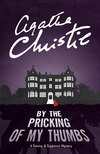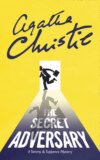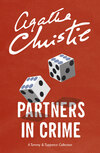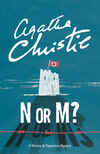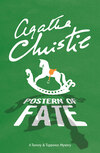Kitabı oku: «By the Pricking of My Thumbs», sayfa 3
‘I see.’
‘Everyone here liked Mrs Lancaster very much. She was a little bit—well, you know what I mean—woolly in the head. I mean, she forgot things, confused things and couldn’t remember names and addresses sometimes.’
‘Did she get many letters?’ said Tuppence. ‘I mean letters from abroad and things?’
‘Well, I think Mrs Johnson—or Mr Johnson—wrote once or twice from Africa but not after the first year. People, I’m afraid, do forget, you know. Especially when they go to a new country and a different life, and I don’t think they’d been very closely in touch with her at any time. I think it was just a distant relation, and a family responsibility, and that was all it meant to them. All the financial arrangements were done through the lawyer, Mr Eccles, a very nice, reputable firm. Actually we’d had one or two dealings with that firm before so that we new about them, as they knew about us. But I think most of Mrs Lancaster’s friends and relations had passed over and so she didn’t hear much from anyone, and I think hardly anyone ever came to visit her. One very nice-looking man came about a year later, I think. I don’t think he knew her personally at all well but he was a friend of Mr Johnson’s and had also been in the Colonial service overseas. I think he just came to make sure she was well and happy.’
‘And after that,’ said Tuppence, ‘everyone forgot about her.’
‘I’m afraid so,’ said Miss Packard. ‘It’s sad, isn’t it? But it’s the usual rather than the unusual thing to happen. Fortunately, most visitors to us make their own friends here. They get friendly with someone who has their own tastes or certain memories in common, and so things settle down quite happily. I think most of them forget most of their past life.’
‘Some of them, I suppose,’ said Tommy, ‘are a little—’ he hesitated for a word ‘—a little—’ his hand went slowly to his forehead, but he drew it away. ‘I don’t mean—’ he said.
‘Oh, I know perfectly what you mean,’ said Miss Packard. ‘We don’t take mental patients, you know, but we do take what you might call borderline cases. I mean, people who are rather senile—can’t look after themselves properly, or who have certain fancies and imaginations. Sometimes they imagine themselves to be historical personages. Quite in a harmless way. We’ve had two Marie Antoinettes here, one of them was always talking about something called the Petit Trianon and drinking a lot of milk which she seemed to associate with the place. And we had one dear old soul who insisted that she was Madame Curie and that she had discovered radium. She used to read the papers with great interest, especially any news of atomic bombs or scientific discoveries. Then she always explained it was she and her husband who had first started experiments on these lines. Harmless delusions are things that manage to keep you very happy when you’re elderly. They don’t usually last all the time, you know. You’re not Marie Antoinette every day or even Madame Curie. Usually it comes on about once a fortnight. Then I suppose presumably one gets tired of keeping the play-acting up. And of course more often it’s just forgetfulness that people suffer from. They can’t quite remember who they are. Or they keep saying there’s something very important they’ve forgotten and if they could only remember it. That sort of thing.’
‘I see,’ said Tuppence. She hesitated, and then said, ‘Mrs Lancaster—Was it always things about that particular fireplace in the sitting-room she remembered, or was it any fireplace?’
Miss Packard stared—‘A fireplace? I don’t understand what you mean.’
‘It was something she said that I didn’t understand—Perhaps she’d had some unpleasant association with a fireplace, or read some story that had frightened her.’
‘Possibly.’
Tuppence said: ‘I’m still rather worried about the picture she gave to Aunt Ada.’
‘I really don’t think you need worry, Mrs Beresford. I expect she’s forgotten all about it by now. I don’t think she prized it particularly. She was just pleased that Miss Fanshawe admired it and was glad for her to have it, and I’m sure she’d be glad for you to have it because you admire it. It’s a nice picture, I thought so myself. Not that I know much about pictures.’
‘I tell you what I’ll do. I’ll write to Mrs Johnson if you’ll give me her address, and just ask if it’s all right to keep it.’
‘The only address I’ve got is the hotel in London they were going to—the Cleveland, I think it was called. Yes, the Cleveland Hotel, George Street, W1. She was taking Mrs Lancaster there for about four or five days and after that I think they were going to stay with some relations in Scotland. I expect the Cleveland Hotel will have a forwarding address.’
‘Well, thank you—And now, about this fur stole of Aunt Ada’s.’
‘I’ll go and bring Miss O’Keefe to you.’
She went out of the room.
‘You and your Mrs Blenkensops,’ said Tommy.
Tuppence looked complacent.
‘One of my best creations,’ she said. ‘I’m glad I was able to make use of her—I was just trying to think of a name and suddenly Mrs Blenkensop came into my mind. What fun it was, wasn’t it?’
‘It’s a long time ago—No more spies in wartime and counter-espionage for us.’
‘More’s the pity. It was fun—living in that guest house—inventing a new personality for myself—I really began to believe I was Mrs Blenkensop.’
‘You were lucky you got away safely with it,’ said Tommy, ‘and in my opinion, as I once told you, you overdid it.’
‘I did not. I was perfectly in character. A nice woman, rather silly, and far too much taken up with her three sons.’
‘That’s what I mean,’ said Tommy. ‘One son would have been quite enough. Three sons were too much to burden yourself with.’
‘They became quite real to me,’ said Tuppence. ‘Douglas, Andrew and—goodness, I’ve forgotten the name of the third one now. I know exactly what they looked like and their characters and just where they were stationed, and I talked most indiscreetly about the letters I got from them.’
‘Well, that’s over,’ said Tommy. ‘There’s nothing to find out in this place—so forget about Mrs Blenkinsop. When I’m dead and buried and you’ve suitably mourned me and taken up your residence in a home for the aged, I expect you’ll be thinking you are Mrs Blenkinsop half of the time.’
‘It’ll be rather boring to have only one role to play,’ said Tuppence.
‘Why do you think old people want to be Marie Antoinette, and Madame Curie and all the rest of it?’ asked Tommy.
‘I expect because they get so bored. One does get bored. I’m sure you would if you couldn’t use your legs and walk about, or perhaps your fingers get too stiff and you can’t knit. Desperately you want something to do to amuse yourself so you try on some public character and see what it feels like when you are it. I can understand that perfectly.’
‘I’m sure you can,’ said Tommy. ‘God help the home for the aged that you go to. You’ll be Cleopatra most of the time, I expect.’
‘I won’t be a famous person,’ said Tuppence. ‘I’ll be someone like a kitchenmaid at Anne of Cleves’ castle retailing a lot of spicy gossip that I’d heard.’
The door opened, and Miss Packard appeared in company with a tall, freckle-faced young woman in nurse’s dress and a mop of red hair.
‘This is Miss O’Keefe—Mr and Mrs Beresford. They have something to tell you. Excuse me, will you? One of the patients is asking for me.’
Tuppence duly made the presentation of Aunt Ada’s fur stole and Nurse O’Keefe was enraptured.
‘Oh! It’s lovely. It’s too good for me, though. You’ll be wanting it yourself—’
‘No, I don’t really. It’s on the big side for me. I’m too small. It’s just right for a tall girl like you. Aunt Ada was tall.’
‘Ah! she was the grand old lady—she must have been very handsome as a girl.’
‘I suppose so,’ said Tommy doubtfully. ‘She must have been a tartar to look after, though.’
‘Oh, she was that, indeed. But she had a grand spirit. Nothing got her down. And she was no fool either. You’d be surprised the way she got to know things. Sharp as a needle, she was.’
‘She had a temper, though.’
‘Yes, indeed. But it’s the whining kind that gets you down—all complaints and moans. Miss Fanshawe was never dull. Grand stories she’d tell you of the old days—Rode a horse once up the staircase of a country house when she was a girl—or so she said—Would that be true now?’
‘Well, I wouldn’t put it past her,’ said Tommy.
‘You never know what you can believe here. The tales the old dears come and tell you. Criminals that they’ve recognized—We must notify the police at once—if not, we’re all in danger.’
‘Somebody was being poisoned last time we were here, I remember,’ said Tuppence.
‘Ah! that was only Mrs Lockett. It happens to her every day. But it’s not the police she wants, it’s a doctor to be called—she’s that crazy about doctors.’
‘And somebody—a little woman—calling out for cocoa—’
‘That would be Mrs Moody. Poor soul, she’s gone.’
‘You mean left here—gone away?’
‘No—it was a thrombosis took her—very sudden. She was one who was very devoted to your Aunt—not that Miss Fanshawe always had time for her—always talking nineteen to the dozen, as she did—’
‘Mrs Lancaster has left, I hear.’
‘Yes, her folk came for her. She didn’t want to go, poor thing.’
‘What was the story she told me—about the fireplace in the sitting-room?’
‘Ah! she’d lots of stories, that one—about the things that happened to her—and the secrets she knew—’
‘There was something about a child—a kidnapped child or a murdered child—’
‘It’s strange it is, the things they think up. It’s the TV as often as not that gives them the ideas—’
‘Do you find it a strain, working here with all these old people? It must be tiring.’
‘Oh no—I like old people—That’s why I took up Geriatric work—’
‘You’ve been here long?’
‘A year and a half—’ She paused. ‘—But I’m leaving next month.’
‘Oh! why?’
For the first time a certain constraint came into Nurse O’Keefe’s manner.
‘Well, you see, Mrs Beresford, one needs a change—’
‘But you’ll be doing the same kind of work?’
‘Oh yes—’ She picked up the fur stole. ‘I’m thanking you again very much—and I’m glad, too, to have something to remember Miss Fanshawe by—She was a grand old lady—You don’t find many like her nowadays.’
CHAPTER 5
Disappearance of an Old Lady
Aunt Ada’s things arrived in due course. The desk was installed and admired. The little work-table dispossessed the whatnot—which was relegated to a dark corner of the hall. And the picture of the pale pink house by the canal bridge Tuppence hung over the mantelpiece in her bedroom where she could see it every morning when drinking her early morning tea.
Since her conscience still troubled her a little, Tuppence wrote a letter explaining how the picture had come into their possession but that if Mrs Lancaster would like it returned, she had only got to let them know. This she dispatched to Mrs Lancaster, c/o Mrs Johnson, at the Cleveland Hotel, George Street, London, W1.
To this there was no reply, but a week later the letter was returned with ‘Not known at this address’ scrawled on it.
‘How tiresome,’ said Tuppence.
‘Perhaps they only stayed for a night or two,’ suggested Tommy.
‘You’d think they’d have left a forwarding address—’
‘Did you put “Please forward” on it?’
‘Yes, I did. I know, I’ll ring them up and ask—They must have put an address in the hotel register—’
‘I’d let it go if I were you,’ said Tommy. ‘Why make all this fuss? I expect the old pussy has forgotten all about the picture.’
‘I might as well try.’
Tuppence sat down at the telephone and was presently connected to the Cleveland Hotel.
She rejoined Tommy in his study a few minutes later.
‘It’s rather curious, Tommy—they haven’t even been there. No Mrs Johnson—no Mrs Lancaster—no rooms booked for them—or any trace of their having stayed there before.’
‘I expect Miss Packard got the name of the hotel wrong. Wrote it down in a hurry—and then perhaps lost it—or remembered it wrong. Things like that often happen, you know.’
‘I shouldn’t have thought it would at Sunny Ridge. Miss Packard is so efficient always.’
‘Perhaps they didn’t book beforehand at the hotel and it was full, so they had to go somewhere else. You know what accommodation in London is like—Must you go on fussing?’
Tuppence retired.
Presently she came back.
‘I know what I’m going to do. I’ll ring up Miss Packard and I’ll get the address of the lawyers—’
‘What lawyers?’
‘Don’t you remember she said something about a firm of solicitors who made all the arrangements because the Johnsons were abroad?’
Tommy, who was busy over a speech he was drafting for a Conference he was shortly to attend, and murmuring under his breath—‘the proper policy if such a contingency should arise’—said: ‘How do you spell contingency, Tuppence?’
‘Did you hear what I was saying?’
‘Yes, very good idea—splendid—excellent—you do that—’
Tuppence went out—stuck her head in again and said:
‘C-o-n-s-i-s-t-e-n-c-y.’
‘Can’t be—you’ve got the wrong word.’
‘What are you writing about?’
‘The Paper I’m reading next at the I.U.A.S. and I do wish you’d let me do it in peace.’
‘Sorry.’
Tuppence removed herself. Tommy continued to write sentences and then scratch them out. His face was just brightening, as the pace of his writing increased—when once more the door opened.
‘Here it is,’ said Tuppence. ‘Partingdale, Harris, Lockeridge and Partingdale, 32 Lincoln Terrace, W.C.2. Tel. Holborn 051386. The operative member of the firm is Mr Eccles.’ She placed a sheet of paper by Tommy’s elbow. ‘Now you take on.’
‘No!’ said Tommy firmly.
‘Yes! She’s your Aunt Ada.’
‘Where does Aunt Ada come in? Mrs Lancaster is no aunt of mine.’
‘But it’s lawyers,’ Tuppence insisted. ‘It’s a man’s job always to deal with lawyers. They just think women are silly and don’t pay attention—’
‘A very sensible point of view,’ said Tommy.
‘Oh! Tommy—do help. You go and telephone and I’ll find the dictionary and look how to spell contingency.’
Tommy gave her a look, but departed.
He returned at last and spoke firmly—‘This matter is now closed, Tuppence.’
‘You got Mr Eccles?’
‘Strictly speaking I got a Mr Wills who is doubtless the dogsbody of the firm of Partingford, Lockjaw and Harrison. But he was fully informed and glib. All letters and communications go via the Southern Counties Bank, Hammersmith branch, who will forward all communications. And there, Tuppence, let me tell you, the trail stops. Banks will forward things—but they won’t yield any addresses to you or anyone else who asks. They have their code of rules and they’ll stick to them—Their lips are sealed like our more pompous Prime Ministers.’
‘All right, I’ll send a letter care of the Bank.’
‘Do that—and for goodness’ sake, leave me alone—or I shall never get my speech done.’
‘Thank you, darling,’ said Tuppence. ‘I don’t know what I’d do without you.’ She kissed the top of his head.
‘It’s the best butter,’ said Tommy.
It was not until the following Thursday evening that Tommy asked suddenly, ‘By the way, did you ever get any answer to the letter you sent care of the Bank to Mrs Johnson—’
‘It’s nice of you to ask,’ said Tuppence sarcastically. ‘No, I didn’t.’ She added meditatively, ‘I don’t think I shall, either.’
‘Why not?’
‘You’re not really interested,’ said Tuppence coldly.
‘Look here, Tuppence—I know I’ve been rather preoccupied—It’s all this I.U.A.S.—It’s only once a year, thank goodness.’
‘It starts on Monday, doesn’t it? For five days—’
‘Four days.’
‘And you all go down to a Hush Hush, top secret house in the country somewhere, and make speeches and read Papers and vet young men for Super Secret assignments in Europe and beyond. I’ve forgotten what I.U.A.S. stands for. All these initials they have nowadays—’
‘International Union of Associated Security.’
‘What a mouthful! Quite ridiculous. And I expect the whole place is bugged, and everybody knows everybody else’s most secret conversations.’
‘Highly likely,’ said Tommy with a grin.
‘And I suppose you enjoy it?’
‘Well, I do in a way. One sees a lot of old friends.’
‘All quite ga-ga by now, I expect. Does any of it do any good?’
‘Heavens, what a question! Can one ever let oneself believe that you can answer that by a plain Yes or No—’
‘And are any of the people any good?’
‘I’d answer Yes to that. Some of them are very good indeed.’
‘Will old Josh be there?’
‘Yes, he’ll be there.’
‘What is he like nowadays?’
‘Extremely deaf, half blind, crippled with rheumatism—and you’d be surprised at the things that don’t get past him.’
‘I see,’ said Tuppence. She meditated. ‘I wish I were in it, too.’
Tommy looked apologetic.
‘I expect you’ll find something to do while I’m away.’
‘I might at that,’ said Tuppence meditatively.
Her husband looked at her with the vague apprehension that Tuppence could always arouse in him.
‘Tuppence—what are you up to?’
‘Nothing, yet—So far I’m only thinking.’
‘What about?’
‘Sunny Ridge. And a nice old lady sipping milk and talking in a scatty kind of way about dead children and fireplaces. It intrigued me. I thought then that I’d try and find out more from her next time we came to see Aunt Ada—But there wasn’t a next time because Aunt Ada died—And when we were next in Sunny Ridge—Mrs Lancaster had—disappeared!’
‘You mean her people had taken her away? That’s not a disappearance—it’s quite natural.’
‘It’s a disappearance—no traceable address—no answer to letters—it’s a planned disappearance. I’m more and more sure of it.’
‘But—’
Tuppence broke in upon his ‘But’.
‘Listen, Tommy—supposing that sometime or other a crime happened—It seemed all safe and covered up—But then suppose that someone in the family had seen something, or known something—someone elderly and garrulous—someone who chattered to people—someone whom you suddenly realized might be a danger to you—What would you do about it?’
‘Arsenic in the soup?’ suggested Tommy cheerfully. ‘Cosh them on the head—Push them down the staircase—?’
‘That’s rather extreme—Sudden deaths attract attention. You’d look about for some simpler way—and you’d find one. A nice respectable Home for Elderly Ladies. You’d pay a visit to it, calling yourself Mrs Johnson or Mrs Robinson—or you would get some unsuspecting third party to make arrangements—You’d fix the financial arrangements through a firm of reliable solicitors. You’ve already hinted, perhaps, that your elderly relative has fancies and mild delusions sometimes—so do a good many of the other old ladies—Nobody will think it odd—if she cackles on about poisoned milk, or dead children behind a fireplace, or a sinister kidnapping; nobody will really listen. They’ll just think it’s old Mrs So-and-So having her fancies again—nobody will take any notice at all.’
‘Except Mrs Thomas Beresford,’ said Tommy.
‘All right, yes,’ said Tuppence. ‘I’ve taken notice—’
‘But why did you?’
‘I don’t quite know,’ said Tuppence slowly. ‘It’s like the fairy stories. By the pricking of my thumbs—Something evil this way comes—I felt suddenly scared. I’d always thought of Sunny Ridge as such a normal happy place—and suddenly I began to wonder—That’s the only way I can put it. I wanted to find out more. And now poor old Mrs Lancaster has disappeared. Somebody’s spirited her away.’
‘But why should they?’
‘I can only think because she was getting worse—worse from their point of view—remembering more, perhaps, talking to people more, or perhaps she recognized someone—or someone recognized her—or told her something that gave her new ideas about something that had once happened. Anyway, for some reason or other she became dangerous to someone.’
‘Look here, Tuppence, this whole thing is all somethings and someones. It’s just an idea you’ve thought up. You don’t want to go mixing yourself up in things that are no business of yours—’
‘There’s nothing to be mixed up in according to you,’ said Tuppence. ‘So you needn’t worry at all.’
‘You leave Sunny Ridge alone.’
‘I don’t mean to go back to Sunny Ridge. I think they’ve told me all they know there. I think that that old lady was quite safe whilst she was there. I want to find out where she is now—I want to get to her wherever she is in time—before something happens to her.’
‘What on earth do you think might happen to her?’
‘I don’t like to think. But I’m on the trail—I’m going to be Prudence Beresford, Private Investigator. Do you remember when we were Blunt’s Brilliant Detectives?’
‘I was,’ said Tommy. ‘You were Miss Robinson, my private secretary.’
‘Not all the time. Anyway, that’s what I’m going to do while you’re playing at International Espionage at Hush Hush Manor. It’s the “Save Mrs Lancaster” that I’m going to be busy with.’
‘You’ll probably find her perfectly all right.’
‘I hope I shall. Nobody would be better pleased than I should.’
‘How do you propose to set about it?’
‘As I told you, I’ve got to think first. Perhaps an advertisement of some kind? No, that would be a mistake.’
‘Well, be careful,’ said Tommy, rather inadequately.
Tuppence did not deign to reply.
On Monday morning, Albert, the domestic mainstay of the Beresfords’ life for many long years, ever since he had been roped into anti-criminal activities by them as a carroty-haired lift-boy, deposited the tray of early morning tea on the table between the two beds, pulled back the curtains, announced that it was a fine day, and removed his now portly form from the room.
Tuppence yawned, sat up, rubbed her eyes, poured out a cup of tea, dropped a slice of lemon in it, and remarked that it seemed a nice day, but you never knew.
Tommy turned over and groaned.
‘Wake up,’ said Tuppence. ‘Remember you’re going places today.’
‘Oh Lord,’ said Tommy. ‘So I am.’
He, too, sat up and helped himself to tea. He looked with appreciation at the picture over the mantelpiece.
‘I must say, Tuppence, your picture looks very nice.’
‘It’s the way the sun comes in from the window sideways and lights it up.’
‘Peaceful,’ said Tommy.
‘If only I could remember where it was I’d seen it before.’
‘I can’t see that it matters. You’ll remember sometime or other.’
‘That’s no good. I want to remember now.’
‘But why?’
‘Don’t you see? It’s the only clue I’ve got. It was Mrs Lancaster’s picture—’
‘But the two things don’t tie up together anyway,’ said Tommy. ‘I mean, it’s true that the picture once belonged to Mrs Lancaster. But it may have been just a picture she bought at an exhibition or that somebody in her family did. It may have been a picture that somebody gave her as a present. She took it to Sunny Ridge with her because she thought it looked nice. There’s no reason it should have anything to do with her personally. If it had, she wouldn’t have given it to Aunt Ada.’
‘It’s the only clue I’ve got,’ said Tuppence.
‘It’s a nice peaceful house,’ said Tommy.
‘All the same, I think it’s an empty house.’
‘What do you mean, empty?’
‘I don’t think,’ said Tuppence, ‘there’s anybody living in it. I don’t think anybody’s ever going to come out of that house. Nobody’s going to walk across that bridge, nobody’s going to untie that boat and row away in it.’
‘For goodness’ sake, Tuppence.’ Tommy stared at her. ‘What’s the matter with you?’
‘I thought so the first time I saw it,’ said Tuppence. ‘I thought “What a nice house that would be to live in.” And then I thought “But nobody does live here, I’m sure they don’t.” That shows you that I have seen it before. Wait a minute. Wait a minute… it’s coming. It’s coming.’
Tommy stared at her.
‘Out of a window,’ said Tuppence breathlessly. ‘Out of a car window? No, no, that would be the wrong angle. Running alongside the canal… and a little hump-backed bridge and the pink walls of the house, the two poplar trees, more than two. There were lots more poplar trees. Oh dear, oh dear, if I could—’
‘Oh, come off it, Tuppence.’
‘It will come back to me.’
‘Good Lord,’ Tommy looked at his watch. ‘I’ve got to hurry. You and your déjà vu picture.’
He jumped out of bed and hastened to the bathroom. Tuppence lay back on her pillows and closed her eyes, trying to force a recollection that just remained elusively out of reach.
Tommy was pouring out a second cup of coffee in the dining-room when Tuppence appeared flushed with triumph.
‘I’ve got it—I know where I saw that house. It was out of the window of a railway train.’
‘Where? When?’
‘I don’t know. I’ll have to think. I remember saying to myself: “Someday I’ll go and look at that house”—and I tried to see what the name of the next station was. But you know what railways are nowadays. They’ve pulled down half the stations—and the next one we went through was all torn down, and grass growing over the platforms, and no name board or anything.’
‘Where the hell’s my brief-case? Albert!’
A frenzied search took place.
Tommy came back to say a breathless goodbye. Tuppence was sitting looking meditatively at a fried egg.
‘Goodbye,’ said Tommy. ‘And for God’s sake, Tuppence, don’t go poking into something that’s none of your business.’
‘I think,’ said Tuppence, meditatively, ‘that what I shall really do, is to take a few railway journeys.’
Tommy looked slightly relieved.
‘Yes,’ he said encouragingly, ‘you try that. Buy yourself a season ticket. There’s some scheme where you can travel a thousand miles all over the British Isles for a very reasonable fixed sum. That ought to suit you down to the ground, Tuppence. You travel by all the trains you can think of in all the likely parts. That ought to keep you happy until I come home again.’
‘Give my love to Josh.’
‘I will.’ He added, looking at his wife in a worried manner, ‘I wish you were coming with me. Don’t—don’t do anything stupid, will you?’
‘Of course not,’ said Tuppence.
Ücretsiz ön izlemeyi tamamladınız.
